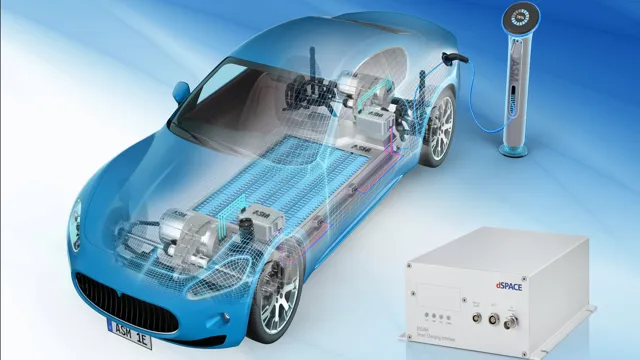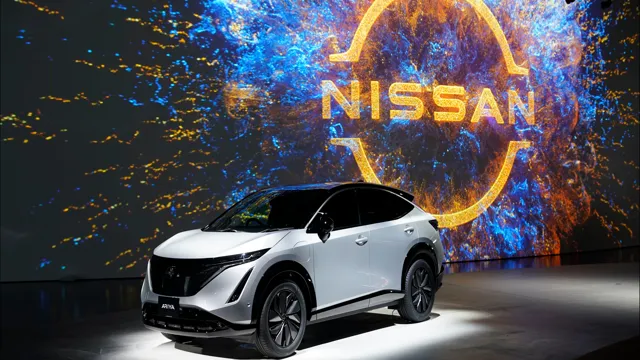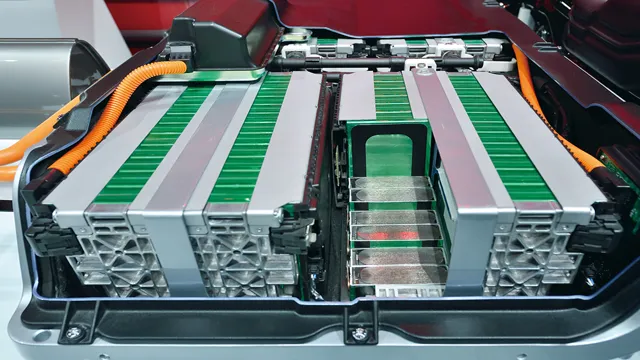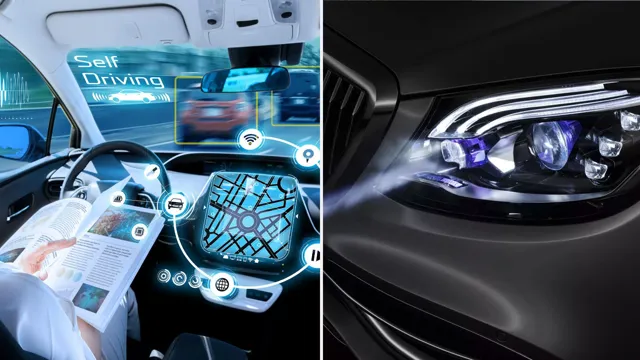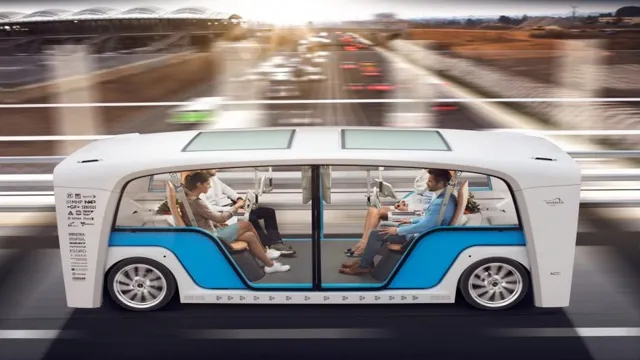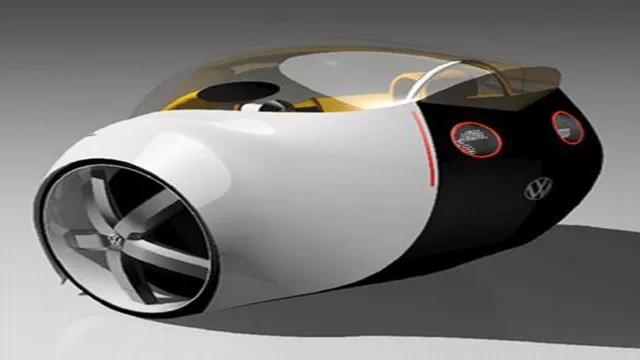Revving Up the Future: Latest Breakthroughs in Electric Car Technology!
Electric cars have been around for a while, but over the last few years, they’ve gained a lot of traction. With Tesla leading the charge, many other automakers have jumped on the electric vehicle bandwagon. So what’s next for electric car technology? In the coming years, we can expect to see even more advanced technologies designed to make electric cars more efficient, convenient, and affordable.
From better battery technology and faster charging to self-driving capabilities and more extensive connectivity features, the future of electric cars looks bright. One of the biggest hurdles for electric car adoption has always been range anxiety. With limited range, drivers have to worry about running out of power and being stranded on the side of the road.
But advancements in battery technology are starting to solve this problem. Lithium-ion batteries are becoming more efficient, and solid-state batteries could provide even more significant improvements, with increased range and faster charging times. Self-driving technology is another area where electric cars are likely to excel.
Since electric cars can be designed with fewer moving parts and more efficient powertrains, they could be ideal candidates for self-driving capabilities. Many automakers are already testing self-driving technology, and the next few years could see significant improvements in this area. Overall, the future of electric car technology looks incredibly bright.
As more and more automakers focus on electrification, we can expect to see a lot of innovation and advancement in the field. If you’re considering an electric car, there’s never been a better time to make the switch. With longer ranges, faster charging, and cutting-edge technology, the cars of tomorrow are going to be truly amazing.
Batteries
When it comes to the latest news on electric car technology, one of the most important developments is in the area of batteries. As electric cars become more popular, research continues to be done to improve the range, efficiency, and longevity of batteries. One exciting development is the use of solid-state batteries, which have the potential to hold more energy, charge faster, and have a longer lifespan than traditional lithium-ion batteries.
Companies like Volkswagen and Toyota are already investing in this technology, with Volkswagen planning to begin production of solid-state batteries in 202 Another interesting development is in the area of recycling batteries, which will become more important as more electric cars hit the road. By recycling the valuable metals and materials within batteries, we can reduce the environmental impact of electric car production and ensure a more sustainable future.
Overall, advancements in battery technology will be key to the continued growth and success of electric cars in the coming years.
Increased Energy Density
Batteries have come a long way, and the latest technologies have made them more potent than ever before. One of the biggest developments is the increase in energy density, which means that batteries can hold more energy in a smaller package. This has led to a surge in the use of batteries in everything from electric cars to portable electronics.
With this increased energy density, batteries can now hold more charge, allowing for longer-lasting use without the need for frequent charging or battery replacement. This development has also made batteries more versatile, allowing them to be used in new and innovative ways. For example, small battery packs can power drones, and larger batteries can store energy from solar panels.
The future of battery technology looks bright, and we can expect even more significant developments in the coming years, making batteries more efficient and capable of powering nearly everything in our lives.

Charging Infrastructure
When it comes to electric vehicles, one of the most crucial components is the battery. Batteries power the vehicle and must be charged regularly to keep the car running. The advancement in battery technology is driving the development of electric vehicles- the more efficient and long-lasting the battery, the more appealing the electric car will be to consumers.
However, the infrastructure for charging electric vehicle batteries remains rather limited, leading to range anxiety among drivers. This is where charging stations play a critical role. Charging infrastructure is necessary to provide a convenient and reliable way for drivers to recharge their vehicle’s batteries.
The installation of charging stations can increase the electric vehicle adoption rate by providing drivers with the confidence that they can access a reliable recharge network on demand. As the electric vehicle market continues to grow, so will the need for charging solutions that serve the diverse needs of drivers.
Autonomous Driving
Autonomous driving is one of the most exciting advancements in the latest news on electric car technology. With the emergence of self-driving cars, we can expect a safer, more efficient, and more convenient future on the roads. Major automakers such as Tesla, Mercedes-Benz, and Volvo are already testing their autonomous vehicles on public roads, with promising results.
Autonomous cars are equipped with state-of-the-art sensors, cameras, and various software programs that are specifically designed to process information from the environment and make decisions on their own. These vehicles have the potential to reduce traffic congestion, lower carbon emissions, and eliminate human error on the roads. As the technology continues to evolve and improve, we can expect more and more vehicles to become fully autonomous, making our driving experience as effortless as possible.
Advancements in Self-Driving Technology
Autonomous driving is an exciting development in the world of transportation. Self-driving technology has advanced tremendously in recent years and has the potential to revolutionize the way we travel. Autonomous vehicles use a range of sensors, cameras, and other technology to navigate and operate on the roads without human input.
The benefits of autonomous driving are numerous, including improved safety, greater efficiency, and reduced traffic congestion. As self-driving technology continues to advance, we can expect to see more innovation, such as cars that can communicate with each other and with the infrastructure around them. However, there is still much work to be done before fully autonomous vehicles are widely adopted.
Legal and regulatory frameworks must be established, and safety standards must be met. Overall, autonomous driving is a promising development that has the potential to transform the way we think about transportation.
Integration with Electric Cars
As electric cars become more and more popular, the integration of autonomous driving technology is becoming increasingly important. Imagine being able to sit back and relax while your car drives itself, taking you to your desired destination without the stress of driving in traffic. This system is highly dependent on sensors and software that are capable of processing large amounts of data quickly and accurately.
By integrating autonomous driving technology with electric cars, we can maximize efficiency and safety on the road. With various sensors and cameras installed in the vehicle, the car can assess its surroundings and navigate routes without the need for human intervention. The integration of these technologies will not only revolutionize the way we travel, but it will also significantly reduce the number of accidents caused by human error, ultimately leading to safer roads.
As more and more manufacturers invest in this technology, we can expect to see a future in which autonomous electric cars are the norm.
Potential Benefits and Drawbacks
Autonomous Driving is a promising technology that comes with potential benefits and drawbacks. One clear benefit is safety. Autonomous vehicles are expected to reduce the number of accidents caused by human error, which could save countless lives and reduce the cost of accident-related injuries.
Another benefit is convenience. Autonomous vehicles can free up time for drivers, allowing them to work, relax, or engage in other activities while on the road. However, there are also some potential drawbacks to consider.
For example, there may be job losses associated with the widespread adoption of autonomous vehicles, particularly in the transportation and delivery industries. Additionally, there are concerns about the ethical dilemmas associated with programming autonomous vehicles to make life-and-death decisions in the event of an unavoidable accident. Despite these concerns, it seems likely that the benefits of autonomous driving will ultimately outweigh the drawbacks.
As the technology continues to improve, we can expect to see more widespread adoption in the coming years.
Sustainability and Environmental Impact
Are you curious about the latest news on electric car technology and what it means for sustainability and the environment? Well, you’re in luck! The industry is rapidly advancing, with new advancements and models hitting the market each year. Electric cars produce significantly fewer emissions than their gasoline-powered counterparts and can even run on renewable energy. Plus, with advancements in battery technology, they can travel longer distances before needing a recharge.
Companies such as Tesla, Nissan, and Ford are leading the charge and pushing the boundaries of what electric cars can do. It’s an exciting time for the automotive industry, and we can expect to see even more innovation in the future! So, if you’re looking to reduce your carbon footprint and save money on gas, an electric car may be just what you need.
Reducing Greenhouse Gas Emissions
Reducing greenhouse gas emissions is critical for preserving the health of our planet and mitigating the impacts of climate change. While it may seem daunting, there are many simple steps that individuals and businesses can take to reduce their environmental impact. For instance, reducing energy consumption by using energy-efficient appliances, upgrading insulation to minimize heat loss, and switching to renewable energy sources such as solar power can all help.
Another important step is reducing transportation emissions by driving less, carpooling, or using public transportation. Additionally, reducing waste and increasing recycling rates can reduce the amount of energy needed to produce new products, which in turn reduces greenhouse gas emissions. By taking these steps, we can all play a role in reducing greenhouse gas emissions and creating a more sustainable future.
Sourcing Materials for Batteries
When it comes to sourcing materials for batteries, sustainability and environmental impact should be top-of-mind. Making sure that the materials used are environmentally friendly and sustainably sourced is key to reducing the impact that the production of batteries has on our planet. For example, we can avoid using metals like cobalt, which are often sourced through unethical and environmentally damaging practices, and instead use recycled materials that have already been extracted.
Another way to ensure sustainability is by using materials that are abundant and easily sourced, such as lithium, which is found in many parts of the world. By prioritizing sustainability in the sourcing of materials for batteries, we can take a significant step towards reducing the environmental impact of battery production and protecting our planet for future generations. So, are you ready to make smarter choices when it comes to the batteries you use?
Cost and Affordability
If you’ve been keeping up with the latest news on electric car technology, you might be wondering about the cost and affordability of these vehicles. While it’s true that electric cars do tend to cost more upfront than their gas-powered counterparts, there are a number of factors to consider when it comes to the true cost of ownership. For one, electricity is often cheaper than gasoline, which can lead to significant savings over time.
Additionally, many electric cars qualify for tax incentives and rebates, which can further offset the cost. And as technology continues to improve, we’re likely to see even more affordable options become available in the coming years. So while electric cars may not be the cheapest option on the market today, they’re definitely worth considering if you’re looking for a more environmentally-friendly and cost-effective way to get around.
Trends in Electric Car Pricing
Electric car pricing is becoming more affordable as the technology behind them improves and becomes more mainstream. The costs associated with the production of electric vehicles have been decreasing, and this trend is expected to continue. However, the upfront costs of purchasing an electric vehicle are still higher compared to traditional gas-powered cars.
The overall cost of owning an electric car proves to be cheaper for drivers in the long run, as they require less maintenance and have lower fuel costs. With government incentives and tax credits for electric car purchases, the affordability factor also improves. In the end, electric cars present a compelling alternative to gasoline vehicles for both environmental and economic reasons.
Government Incentives and Subsidies
When it comes to purchasing a new home, cost and affordability are major concerns for many buyers. Fortunately, there are a variety of government incentives and subsidies that can make homeownership more accessible and affordable. These incentives can take many forms, including tax credits, down payment assistance programs, and grants for low-income buyers.
Additionally, some programs are designed to incentivize energy-efficient home upgrades, such as solar panel installation or insulation improvements. By taking advantage of these government incentives, homebuyers can often dramatically reduce their costs and make homeownership a more realistic and affordable option. However, it’s important to carefully research and understand the eligibility requirements and application processes for these programs to ensure that you are taking full advantage of all available options.
Long-Term Cost Savings
When it comes to long-term cost savings, it’s important to consider both the immediate upfront costs and the potential savings over time. While some may be deterred by the initial costs of certain investments, such as renewable energy systems or energy-efficient appliances, it’s essential to think about the long-term affordability and benefits. For example, although a solar panel system may have a higher initial cost, it can save you thousands of dollars on energy bills over time.
Similarly, choosing energy-efficient appliances can also save you money on utility bills month after month. It’s important to think about the bigger picture and how investments in sustainability can provide long-term cost savings. By making these choices, you’ll not only save money, but you’ll also reduce your carbon footprint and contribute to a healthier planet.
Conclusion
As the race for better and more efficient electric cars continues to heat up, it seems that the future of eco-friendly transportation is brighter than ever before. With advances in battery technology, charging infrastructure, and autonomous driving, we may soon see a world where electric cars are the norm instead of the exception. So, buckle up and plug in, because the electric revolution is just getting started!”
FAQs
What are the latest electric car technology advancements?
The latest advancements in electric car technology include improved battery life, faster charging, and increased driving range.
How do electric cars compare to traditional gas-powered cars?
Electric cars are more efficient, cheaper to operate, and produce no emissions, while gas-powered cars have a longer range and easier refueling.
What is the future of electric car technology?
The future of electric car technology is promising, with continued advancements in batteries, charging infrastructure, and autonomous driving features.
Are there any drawbacks to electric car technology?
Some limitations of electric car technology include range anxiety for longer trips and higher upfront costs compared to traditional gas-powered cars.

